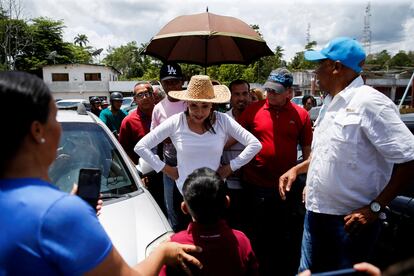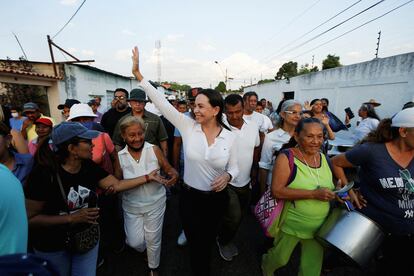María Corina Machado: The radical opposition leader gaining momentum in Venezuela
Up to 14 opposition candidates are taking part in the October 22 primaries, which will decide who will face Maduro in 2024. The so-called ‘iron lady’ is leading the polls with more than 50% of support

María Corina Machado’s opposition to everything is starting to pay off. In a country where life is marked by disillusionment and despair, most Venezuelans are also fed up with everything, and many of them have turned to the so-called “iron lady” of the opposition.
Machado is now leading the polls for the opposition primaries, which will be held on October 22. While it’s still too early to say who will win, the politician — once marginalized for her refusal to back any strategy that did not involve ending Chavismo by force — is shaping up to be the candidate to face off against Nicolás Maduro at the 2024 presidential election.
A total of 14 candidates are running in the opposition primaries, but only two names have a real chance of winning: the moderate Henrique Capriles and the radical Machado. With four months to go, Machado is in the lead, with over 50% of support. Whoever wins will have to unite the rest of the opposition parties if they want to defeat Maduro.
But a change in government will not be easy. At the end of 2021, when the opposition won the state elections in Barinas, which had been governed by the Chávez family since 1998, there were hopes that things could change. The opposition believed that by ironing out their differences, rallying behind a single candidate and going to the elections as one force, they could have a chance at winning over the country, which is home to 28 million people. This strategy, however, came crashing down due to deep divisions within the group and the government’s moves to thwart any kind of opposition victory.
Today, the country is in a very different place to where it was at the end of 2021, when Chavismo accepted the opposition win. Maduro has so far refused to set a date for the presidential elections and is taking advantage of the time to dampen hopes — roused by the Barinas election — that change is possible in Venezuela.

Machado rose to prominence for her outspoken opposition to the late Venezuelan leader Hugo Chávez. But over time, she became less visible, as other opposition leaders came to the fore, with whom she has a deep enmity. Machado, for example, has been just as critical of the interim government of Juan Guaidó, which unsuccessfully sought the end of Chavism through confrontation, as she has been of the moderate sector of the opposition, which believes in changing the government at the polls.
Machado wanted to end the government by force with the help of the U.S., but this was never even a properly thought-out idea. Now, after arguing that taking part in elections legitimizes the Maduro government, Machado could be the opposition candidate at the presidential election.
While before she had support among Venezuela’s upper class and exile community, today she is able to hold large-scale rallies in Chavista strongholds and far from Caracas, where her followers grab her hand as if it were the only thing they had left.
Even still, winning the presidential election will be a challenge. While 70% of the population rejects the government, the opposition is not faring any better.
“Maduro has the support of between 28% and 30% and has halted the decline he had been seeing since the end of 2022. While that number does not give him the majority, if the others do not do their job, Maduro’s could be the largest minority,” warns Luis Vidal, director of pollster More Consulting. At least 50% of voters do not back either Chavismo or the opposition. It is these voters the winner of the opposition primary must try to convince in order to win the 2024 election.
Adding to the uncertainty is the fact that comedian Benjamin Rausseo, who is the second-most popular figure in the opposition, said that he will not run in the opposition primaries, but will run as an independent in the presidential election. Complicating matters further, Capriles has been banned from public office, but said he would run anyway. And there are also rumors that Machado may also be disqualified from running.
At this point, anything can be expected from the Maduro government, especially now that it has a stronger position on the world stage and has benefited from the energy crisis triggered by the war in Ukraine.
Some opposition parties have tried to rally the seven million Venezuelans living abroad, but only 100,000 of them are registered to vote overseas. Within Venezuela, another three million potential voters are not registered due to the collapse of the National Electoral Council (CNE), resulting from the National Assembly’s decision to order the CNE rectors to step down.
In the meantime, the so-called “iron lady” is playing the role of as an outsider, even if she has been involved in politics for years. And the strategy is working: Machado is winning over Venezuelans who, fed up with everything, do not want either Chavismo or the opposition.
Sign up for our weekly newsletter to get more English-language news coverage from EL PAÍS USA Edition
Tu suscripción se está usando en otro dispositivo
¿Quieres añadir otro usuario a tu suscripción?
Si continúas leyendo en este dispositivo, no se podrá leer en el otro.
FlechaTu suscripción se está usando en otro dispositivo y solo puedes acceder a EL PAÍS desde un dispositivo a la vez.
Si quieres compartir tu cuenta, cambia tu suscripción a la modalidad Premium, así podrás añadir otro usuario. Cada uno accederá con su propia cuenta de email, lo que os permitirá personalizar vuestra experiencia en EL PAÍS.
¿Tienes una suscripción de empresa? Accede aquí para contratar más cuentas.
En el caso de no saber quién está usando tu cuenta, te recomendamos cambiar tu contraseña aquí.
Si decides continuar compartiendo tu cuenta, este mensaje se mostrará en tu dispositivo y en el de la otra persona que está usando tu cuenta de forma indefinida, afectando a tu experiencia de lectura. Puedes consultar aquí los términos y condiciones de la suscripción digital.








































